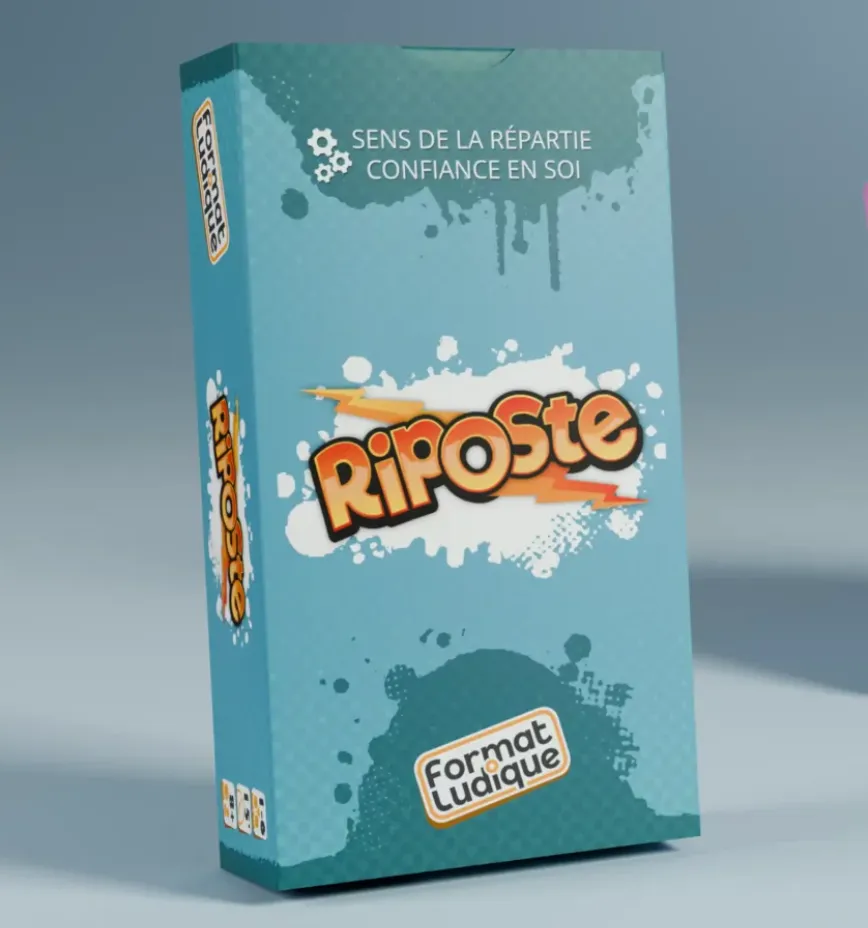
4 Serious Games That Boost Team Communication


This article is the third in our series about #play14 Nancy. The first two articles focused on icebreaker games that can be used to warm up a group of people, and serious games that focus on how to improve collaboration within a team.
#play14 being an event about games, this article will still focus on serious games, as you can imagine. Communication being fundamental when it comes to working as a team, there were a few workshops at #play14 Nancy that focused on this soft skill.
We chose to highlight four Serious Games that were designed to improve communication, each one focusing on a specific goal:
- Highlighting the importance of communication and feedback within a team
- Supporting individuals in making decisions
- Learning how to defuse verbal attacks
- And a box to share words around the world
This article also features how to apply serious games in a project or in a company event.
The Helium Stick: A Game to Highlight the Importance of Feedback
The Helium Stick is a deceptively simple game suggested by Florian Ferbach. The setup is straightforward: build a lightweight stick, as thin as possible (paper works well), to act as the “helium stick.”
The rules are simple: all participants should hold the stick on top of their index fingers and lower it to the ground. Every team member must stay in contact with the helium stick. If a single finger loses contact, the group has to start over.
YouTube might track you and we would rather have your consent before loading this video.
Sounds easy? Not at all! We tried it, and it turned out to be both chaotic and hilarious. The stick floats upward instead of going down, and players start blaming each other: “What are you doing?” “Stop pushing it up!”, even though everyone’s having the same reflex. If you want to see it in action, I recommend watching this video to better grasp the dynamic.
The stick is so light that it’s hard to feel when you’re actually touching it. So as soon as one person pushes slightly to ensure contact, others feel less pressure and do the same, causing the stick to rise even more.
We also tried a variation with a heavier stick, a broomstick, and the experience was completely different. Because we could clearly feel the stick’s weight, it became much easier to lower it smoothly without losing contact.
I really enjoyed this workshop because it was both fun and a great metaphor for real-world projects: without feedback, reaching a goal becomes much harder. At Marmelab, for instance, we make it a point to engage users regularly to gather feedback. It helps us confirm that we’re on the right track or adjust our direction when needed. When that feedback loop is missing, we fall into what’s called the tunnel effect, where progressing toward our objectives becomes much more challenging.
Questiorming: What Kind of Questions Really Help Decision-Making?
Paul Cieslar, a professional coach, led a workshop designed to explore the types of questions that support decision-making.
One participant wanted help with a personal situation, which she shared with us in a few words. In this workshop, we asked her questions and she answered with a number between 1 and 5 indicating the effect of the question on her problem, without giving the actual answer to the question (we don’t need to know her choice and personal answers to help her).
- Example of questions that didn’t help: “Is anyone stopping you from doing it?” The answer is “Yes” or “No”. This question has been answered and doesn’t encourage deeper thinking.
- Example of useful questions: “What’s stopping you from doing it?” The person thought for a few seconds before saying “Nothing, really” and confessing that they had made up their mind.
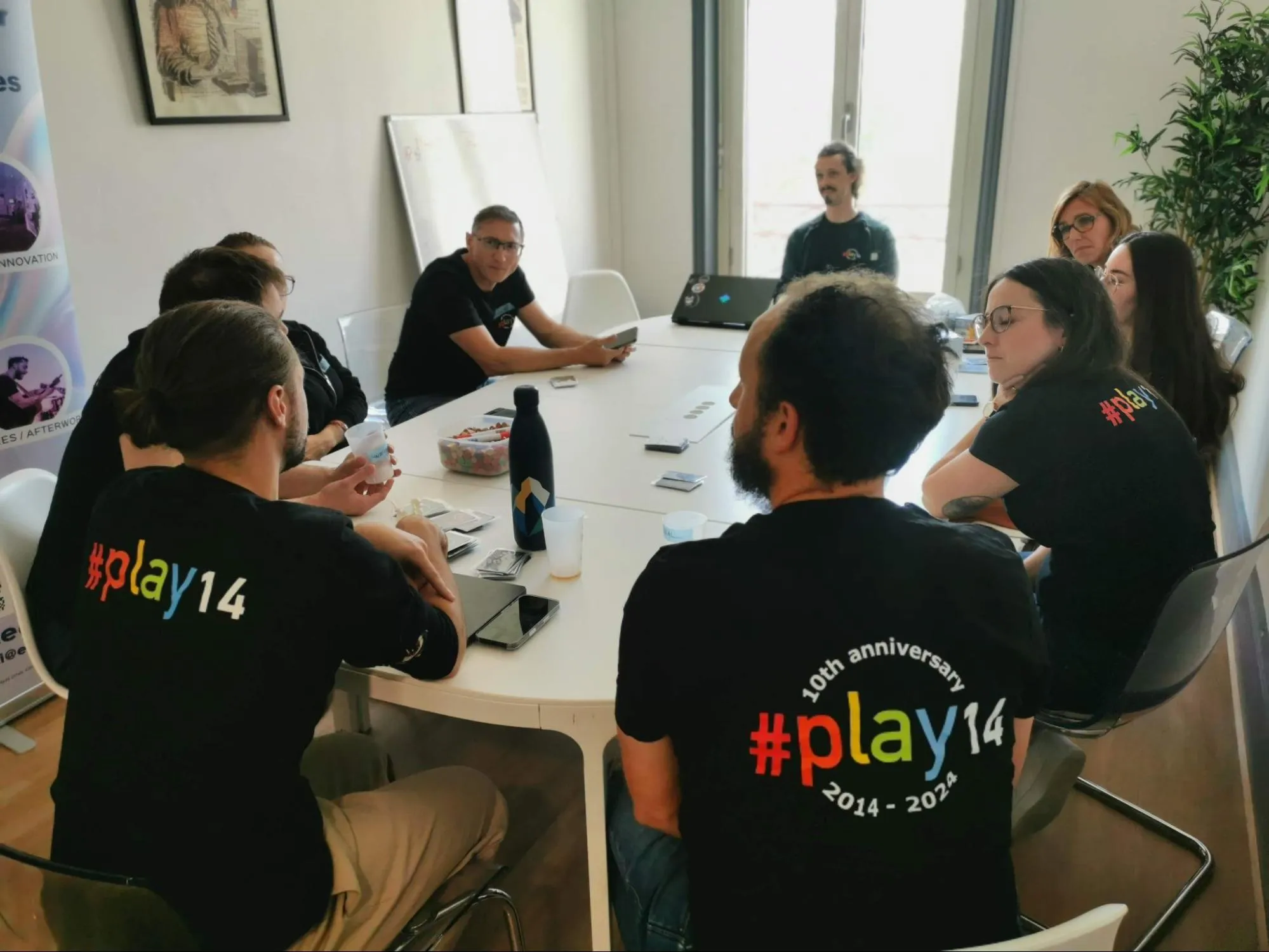
What makes this workshop particularly interesting is the opportunity to experience both roles: helping someone and being helped.
For instance, when you’re in the helper’s role, it might seem helpful to ask questions about the past to understand the root of the problem before moving toward a solution. But from the other side, as the person being helped, those same questions can feel like you’re being judged or having your past choices questioned, which can be more frustrating than helpful.
This workshop also led us to realize that open questions unconsciously help the interlocutor push their thinking process forward, unlike closed questions.
This workshop left a strong impression on me, so I decided to run it myself during a Marmelab retreat. The reaction was the same: participants were initially skeptical, but soon surprised by how powerful thoughtful, well-framed questions can be in helping someone move an idea forward.
A Game to Learn How to Defuse Verbal Attacks
Almost everyone has been on the receiving end of a verbal attack, whether it’s a one-off incident on the street or something more frequent, like in school or family settings.
François Freund, a designer of educational board games, introduced us to Kit de Self-Défense Relationnelle (Relational Self-Defense Kit in English), a game that teaches how to respond effectively and defuse tense situations.
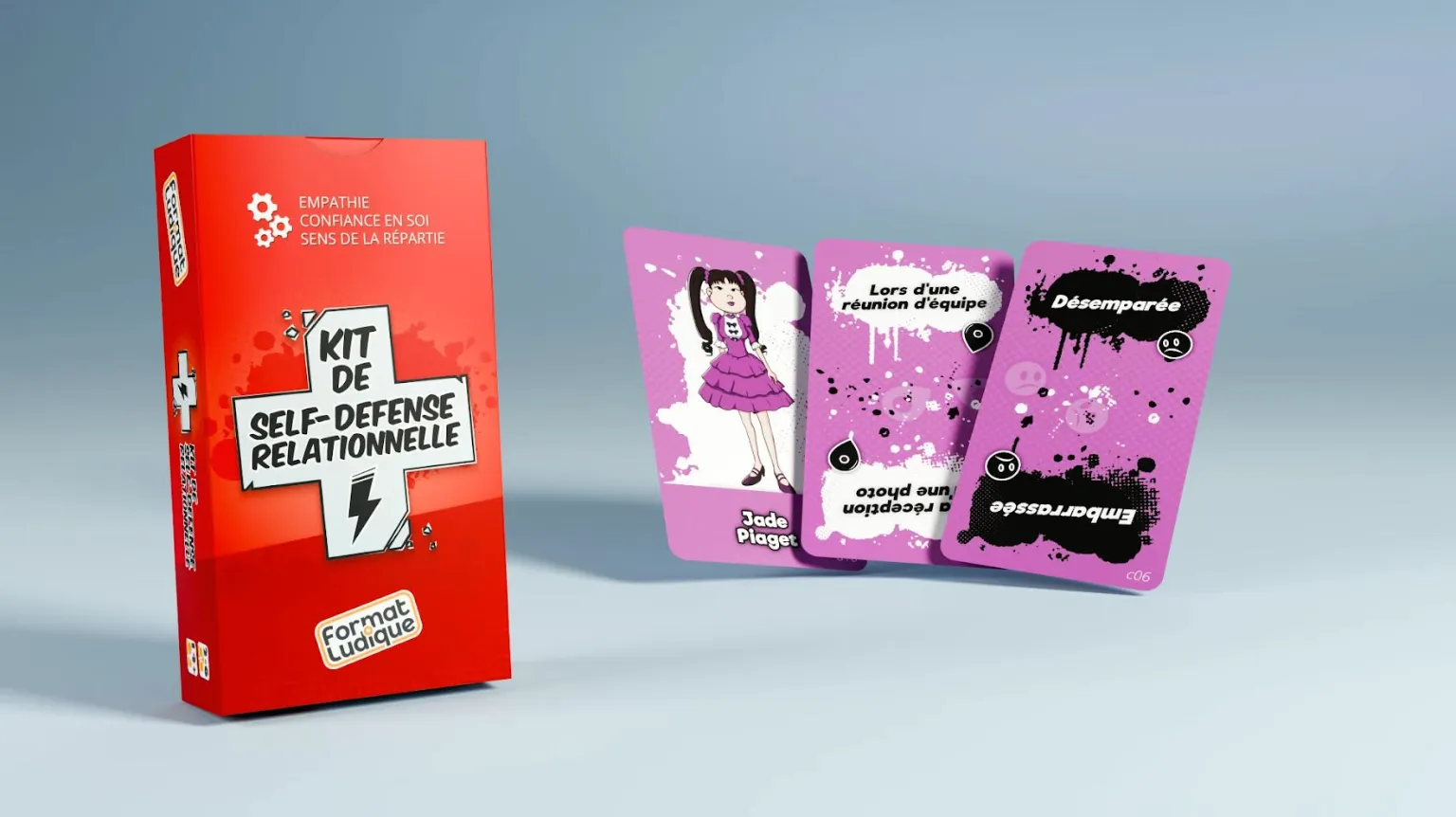
Through realistic yet fictional scenarios, François gave us practical tools not only to prevent escalation, but also to disarm the attacker and reduce the chances of a repeat incident.
For example, using self-deprecating humor or posing a calm question can shift the power dynamic and subtly throw the aggressor off balance.
But there are various techniques for defusing a conversation, and not all are suitable for every situation. For example, your response may differ depending on how important it is to you to preserve the relationship with the aggressor. The game also invites you to think about why a particular technique works in a specific case.
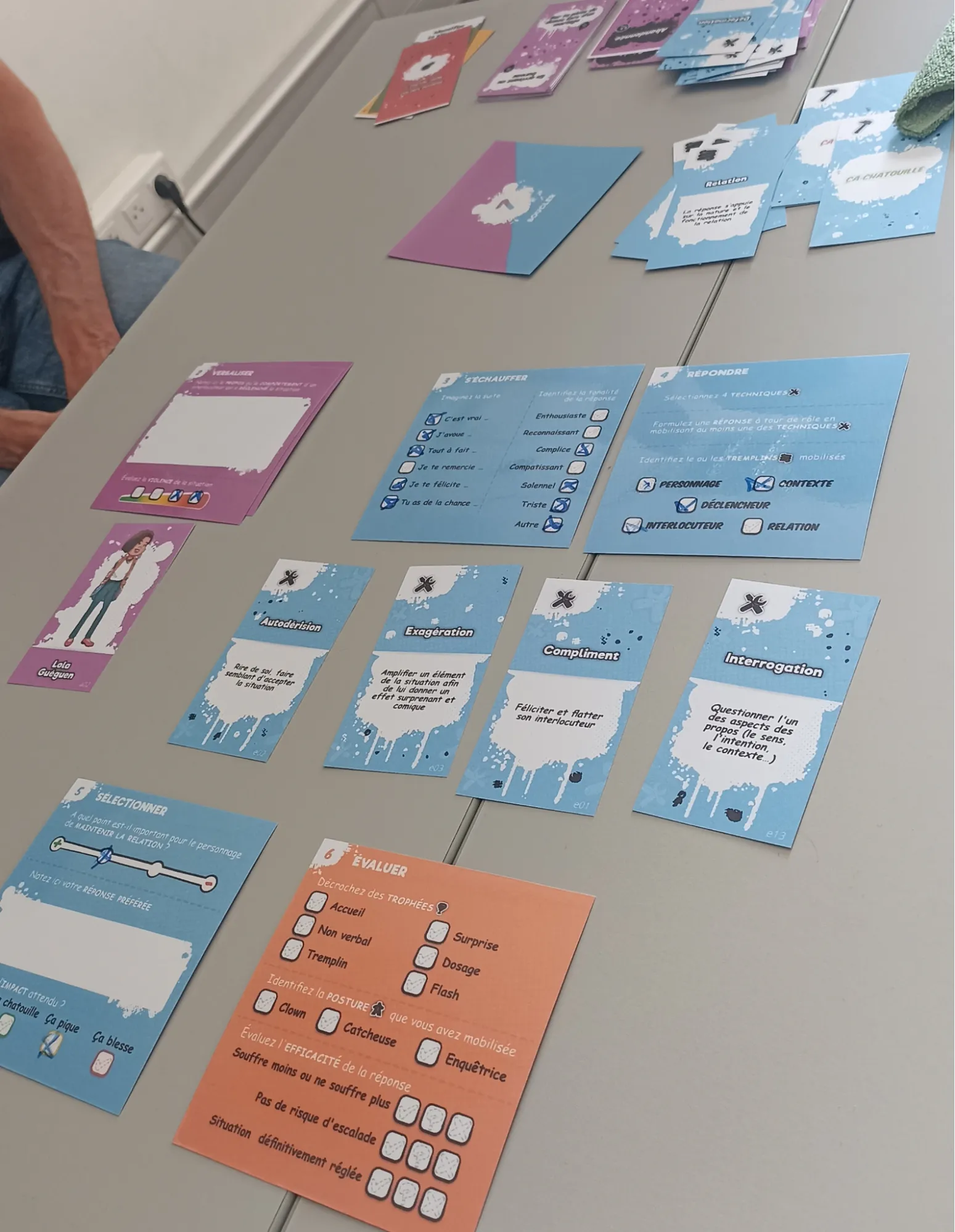
This game was a powerful and eye-opening experience, offering practical, evidence-based techniques that really work in real-life situations.
We played the adult version that will be released at the end of 2025, but there’s also a version for teenagers: Riposte. It’s very similar, though the scenarios are tailored to the target audience. For example, the adult version includes workplace situations, while the teen version focuses more on issues like school bullying.
Setting up a Serious Game
During #play14 Nancy, we attended a workshop by Daniel Larose, the founder and game designer from La Rose des Jeux, who helped us explore the theory behind games. Its main objective was to answer a deceptively simple question: What is a game?
The session began with this open-ended question, prompting a wide range of responses from participants. Some emphasized rules and structure, while others highlighted the importance of fun. Interestingly, it quickly became clear that there was no single, universally agreed-upon definition of a game.
To address this, Daniel introduced a definition based on the work of French sociologist Roger Caillois who wrote “Des hommes et des Jeux”, extended by the work of French researcher Gilles Brougère, and Dutch historian Johan Huizinga who wrote “Homo Ludens”. The definition outlines five core principles to define a game:
- Explicit rules: Players must know what they are playing, even if they are guessing the rules.
- Limited in time and space: Players know the limits of the game.
- Free will: Players cannot be forced to play.
- Impact: Players must be able to influence the course and outcome of the game.
- Frivolity: The game has no influence on real life (which is a very Platonic idea. Games inevitably have an impact, but in design, the goal of a game is to entertain players).
Daniel claims that frivolity is critical, as our mission as facilitators is to use the joy generated by a situation presented as playful to introduce serious concepts which are not frivolous.
Another definition of a game has been developed by French sociologist Olivier Caïra. Rather than focusing on fun or entertainment, Olivier Caïra defines a game as a human construct that meets seven key criteria:
- Principle of Optional Entry: Participation must be voluntary; players are free to join or not.
- Principle of Reversibility: Outcomes (victories or defeats) are temporary and can be undone; nothing about the game should have irreversible consequences on one’s health or social life.
- Principle of Direct Personal Action: The player must have control over their actions within the game.
- Principle of Uncertainty: The outcome must involve chance or be balanced enough to maintain unpredictability.
- Principle of Legibility: Rules and structure must be clear and shared by all participants; the space and duration of the game must be well-defined.
- Principle of Interchangeability of Places: Rather than equality, this principle allows for asymmetry, as seen in war games or diplomacy, where roles and power may be uneven, but still interchangeable.
- Bateson’s Principle: Even if in-game actions resemble real-life actions (like in sports or mock battles), players and observers can still distinguish that the activity is part of a game.
A particularly thought-provoking insight from Caïra’s framework is that “fun” is not one of the seven core principles. This challenges the common assumption that enjoyment is a necessary component of a game. In fact, a game can be meaningful or engaging without being traditionally fun.
Overall, the workshop offered a fascinating look into the theory of games. It emphasized that the goal of a game is defined by its designer, and Caïra’s seven principles provide a strong foundation for thinking critically. Those principles are vital for a serious game: not following them can cause frustration or make participants uncomfortable, which would cause the opposite of what was expected in the first place. Therefore, it is important to communicate these principles before the game so everyone sees the activity as a game and not a constraint.
Event Bonus: An Escape Box to Write a Word for Other #play14 Participants

New and surprising this year: a giant escape box that travels the world. The game designer Daniel Larose has imagined and designed a closed box with 12 padlocks that require codes to be opened.
The codes can be retrieved through various puzzles that can be completed as a team. The key to opening the box is collaboration, and the game strengthened the bonds we had with other participants of the #play14 Nancy edition.
Inside the box, there is a notebook with testimonials from #play14 participants all around the world. This provides a way to share with community members and build up connections between #play14 events that take place in different locations.
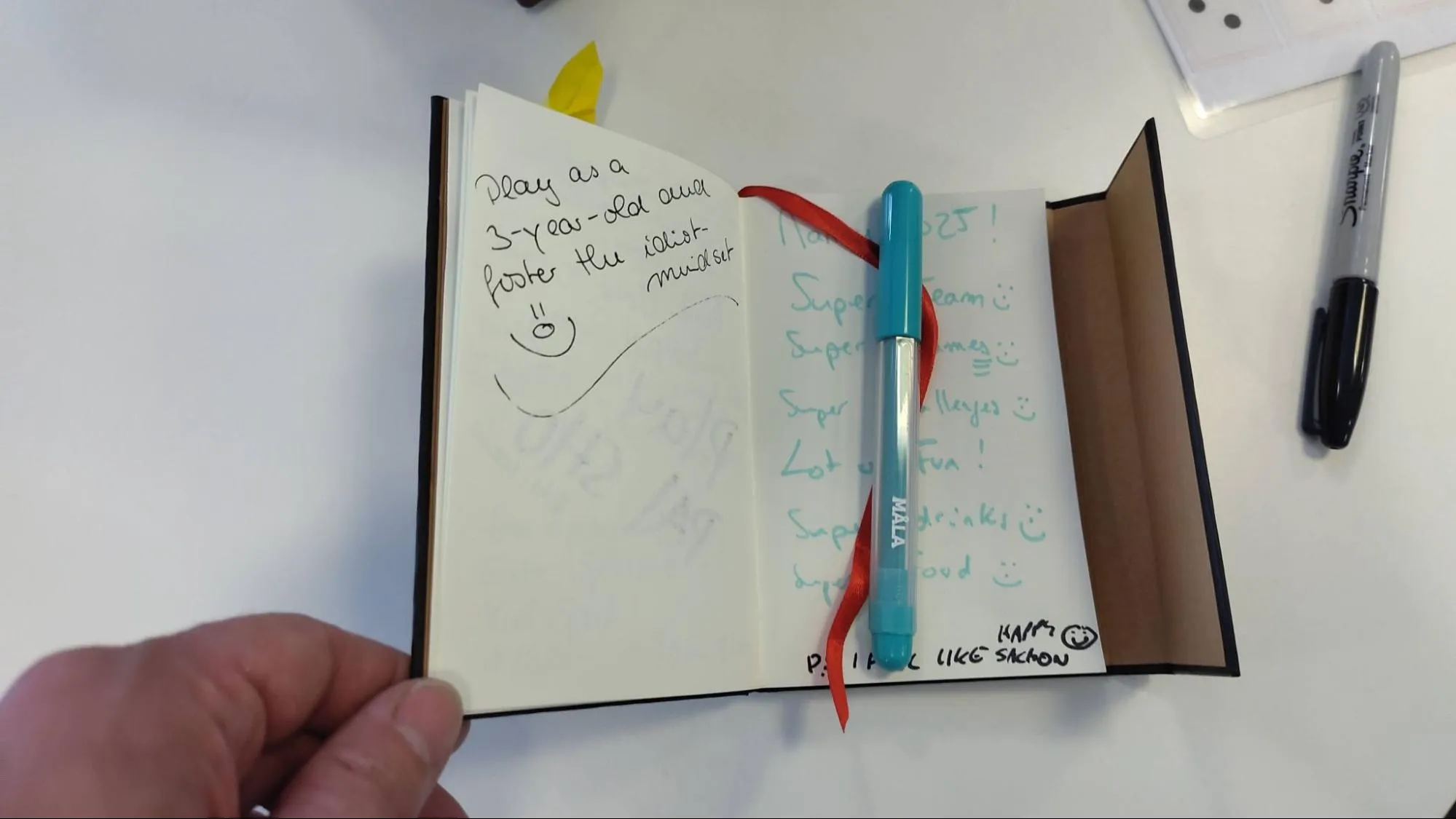
This can be an interesting way to share moments between multiple company retreats or conferences.
Conclusion
Communication is fundamental when it comes to working as a team. Serious games provide a practical and engaging way to strengthen your team members’ communication skills.
In this article, we’ve explored four games that provide practical ways for teams to communicate more effectively in many situations: giving better feedback, navigating verbal conflicts, and encouraging clear, impactful questioning.
While these games do not cover all communication problems an organization can face, we believe that every challenge can be answered by a serious game that focuses on that particular pain point.
A big thank you to Yann Gensollen and Cédric Pontet for organizing the 2025 Nancy edition of #play14!
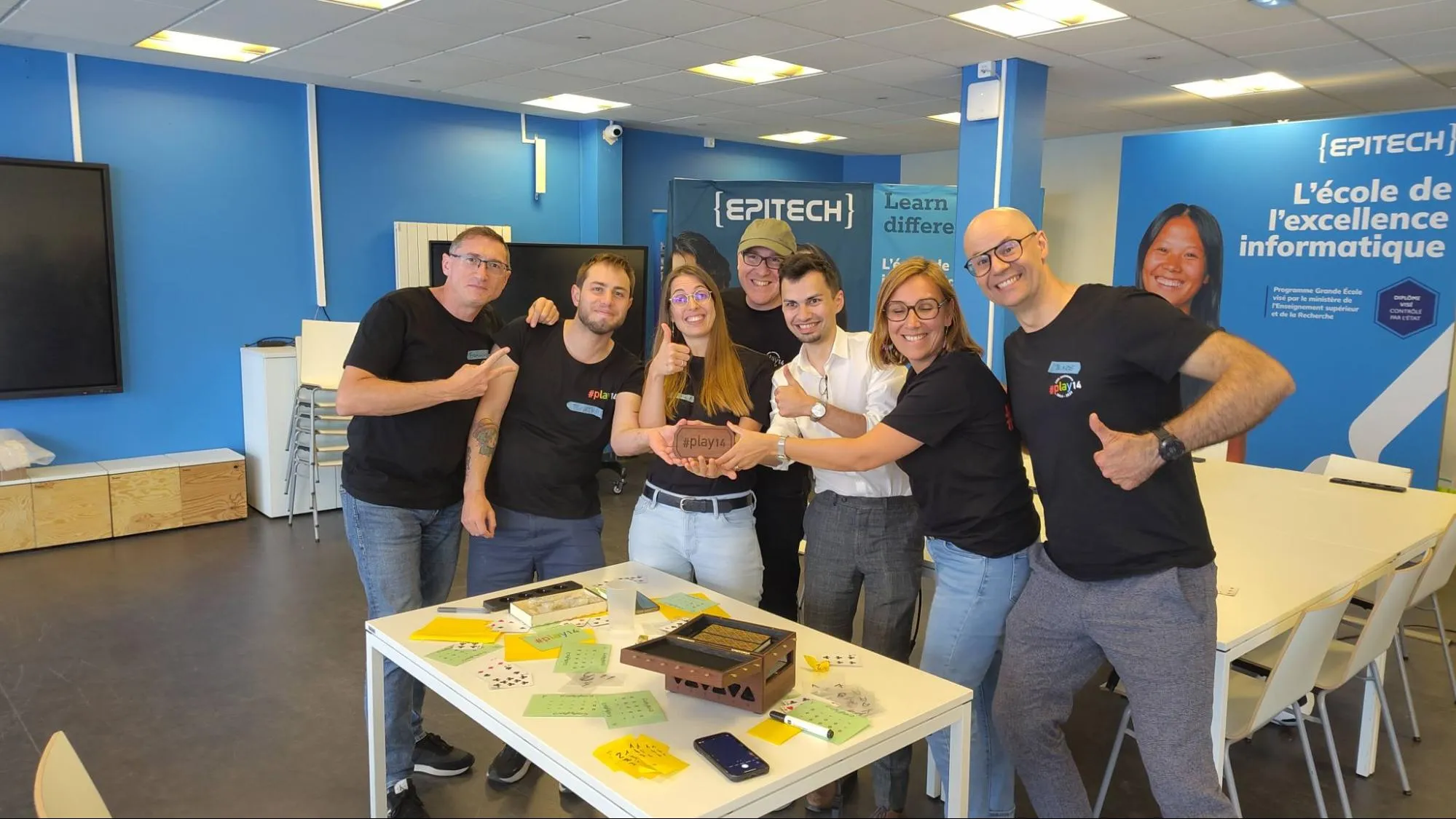
Authors

Facilitator at Marmelab, she lives with two rabbits and loves playing boards games.

Full-stack web developer at marmelab, Jonathan likes to cook and do photography on his spare time.
